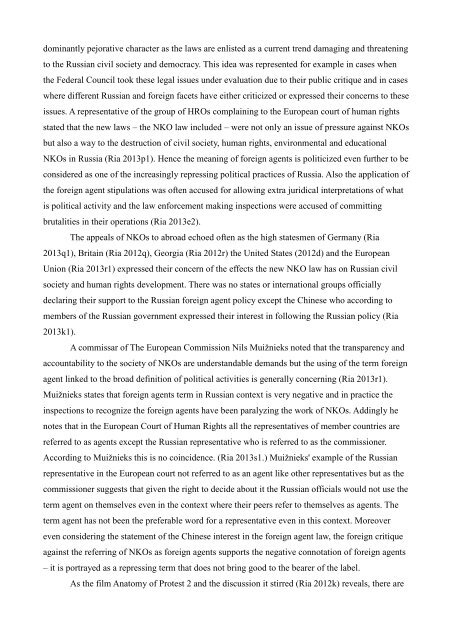Foreign Agents in Russia - Doria
Foreign Agents in Russia - Doria
Foreign Agents in Russia - Doria
Create successful ePaper yourself
Turn your PDF publications into a flip-book with our unique Google optimized e-Paper software.
74<br />
dom<strong>in</strong>antly pejorative character as the laws are enlisted as a current trend damag<strong>in</strong>g and threaten<strong>in</strong>g<br />
to the <strong>Russia</strong>n civil society and democracy. This idea was represented for example <strong>in</strong> cases when<br />
the Federal Council took these legal issues under evaluation due to their public critique and <strong>in</strong> cases<br />
where different <strong>Russia</strong>n and foreign facets have either criticized or expressed their concerns to these<br />
issues. A representative of the group of HROs compla<strong>in</strong><strong>in</strong>g to the European court of human rights<br />
stated that the new laws – the NKO law <strong>in</strong>cluded – were not only an issue of pressure aga<strong>in</strong>st NKOs<br />
but also a way to the destruction of civil society, human rights, environmental and educational<br />
NKOs <strong>in</strong> <strong>Russia</strong> (Ria 2013p1). Hence the mean<strong>in</strong>g of foreign agents is politicized even further to be<br />
considered as one of the <strong>in</strong>creas<strong>in</strong>gly repress<strong>in</strong>g political practices of <strong>Russia</strong>. Also the application of<br />
the foreign agent stipulations was often accused for allow<strong>in</strong>g extra juridical <strong>in</strong>terpretations of what<br />
is political activity and the law enforcement mak<strong>in</strong>g <strong>in</strong>spections were accused of committ<strong>in</strong>g<br />
brutalities <strong>in</strong> their operations (Ria 2013e2).<br />
The appeals of NKOs to abroad echoed often as the high statesmen of Germany (Ria<br />
2013q1), Brita<strong>in</strong> (Ria 2012q), Georgia (Ria 2012r) the United States (2012d) and the European<br />
Union (Ria 2013r1) expressed their concern of the effects the new NKO law has on <strong>Russia</strong>n civil<br />
society and human rights development. There was no states or <strong>in</strong>ternational groups officially<br />
declar<strong>in</strong>g their support to the <strong>Russia</strong>n foreign agent policy except the Ch<strong>in</strong>ese who accord<strong>in</strong>g to<br />
members of the <strong>Russia</strong>n government expressed their <strong>in</strong>terest <strong>in</strong> follow<strong>in</strong>g the <strong>Russia</strong>n policy (Ria<br />
2013k1).<br />
A commissar of The European Commission Nils Muižnieks noted that the transparency and<br />
accountability to the society of NKOs are understandable demands but the us<strong>in</strong>g of the term foreign<br />
agent l<strong>in</strong>ked to the broad def<strong>in</strong>ition of political activities is generally concern<strong>in</strong>g (Ria 2013r1).<br />
Muižnieks states that foreign agents term <strong>in</strong> <strong>Russia</strong>n context is very negative and <strong>in</strong> practice the<br />
<strong>in</strong>spections to recognize the foreign agents have been paralyz<strong>in</strong>g the work of NKOs. Add<strong>in</strong>gly he<br />
notes that <strong>in</strong> the European Court of Human Rights all the representatives of member countries are<br />
referred to as agents except the <strong>Russia</strong>n representative who is referred to as the commissioner.<br />
Accord<strong>in</strong>g to Muižnieks this is no co<strong>in</strong>cidence. (Ria 2013s1.) Muižnieks' example of the <strong>Russia</strong>n<br />
representative <strong>in</strong> the European court not referred to as an agent like other representatives but as the<br />
commissioner suggests that given the right to decide about it the <strong>Russia</strong>n officials would not use the<br />
term agent on themselves even <strong>in</strong> the context where their peers refer to themselves as agents. The<br />
term agent has not been the preferable word for a representative even <strong>in</strong> this context. Moreover<br />
even consider<strong>in</strong>g the statement of the Ch<strong>in</strong>ese <strong>in</strong>terest <strong>in</strong> the foreign agent law, the foreign critique<br />
aga<strong>in</strong>st the referr<strong>in</strong>g of NKOs as foreign agents supports the negative connotation of foreign agents<br />
– it is portrayed as a repress<strong>in</strong>g term that does not br<strong>in</strong>g good to the bearer of the label.<br />
As the film Anatomy of Protest 2 and the discussion it stirred (Ria 2012k) reveals, there are
















